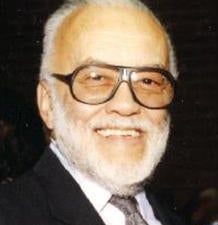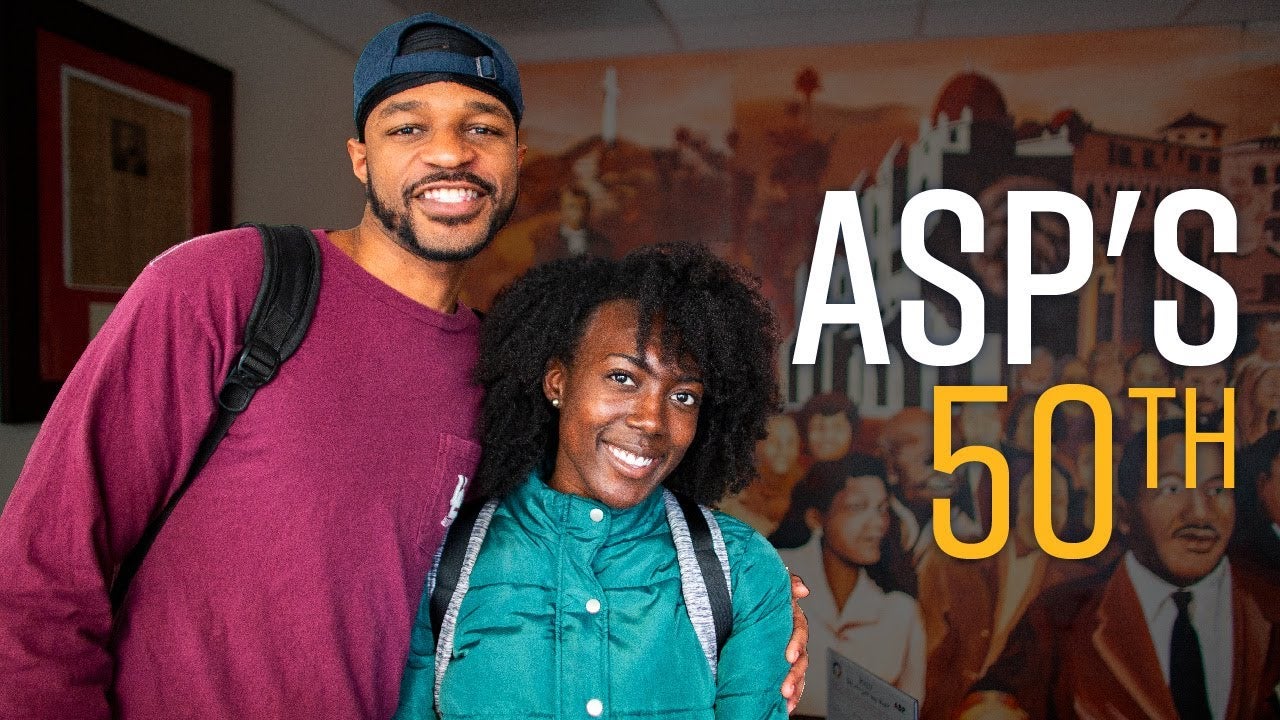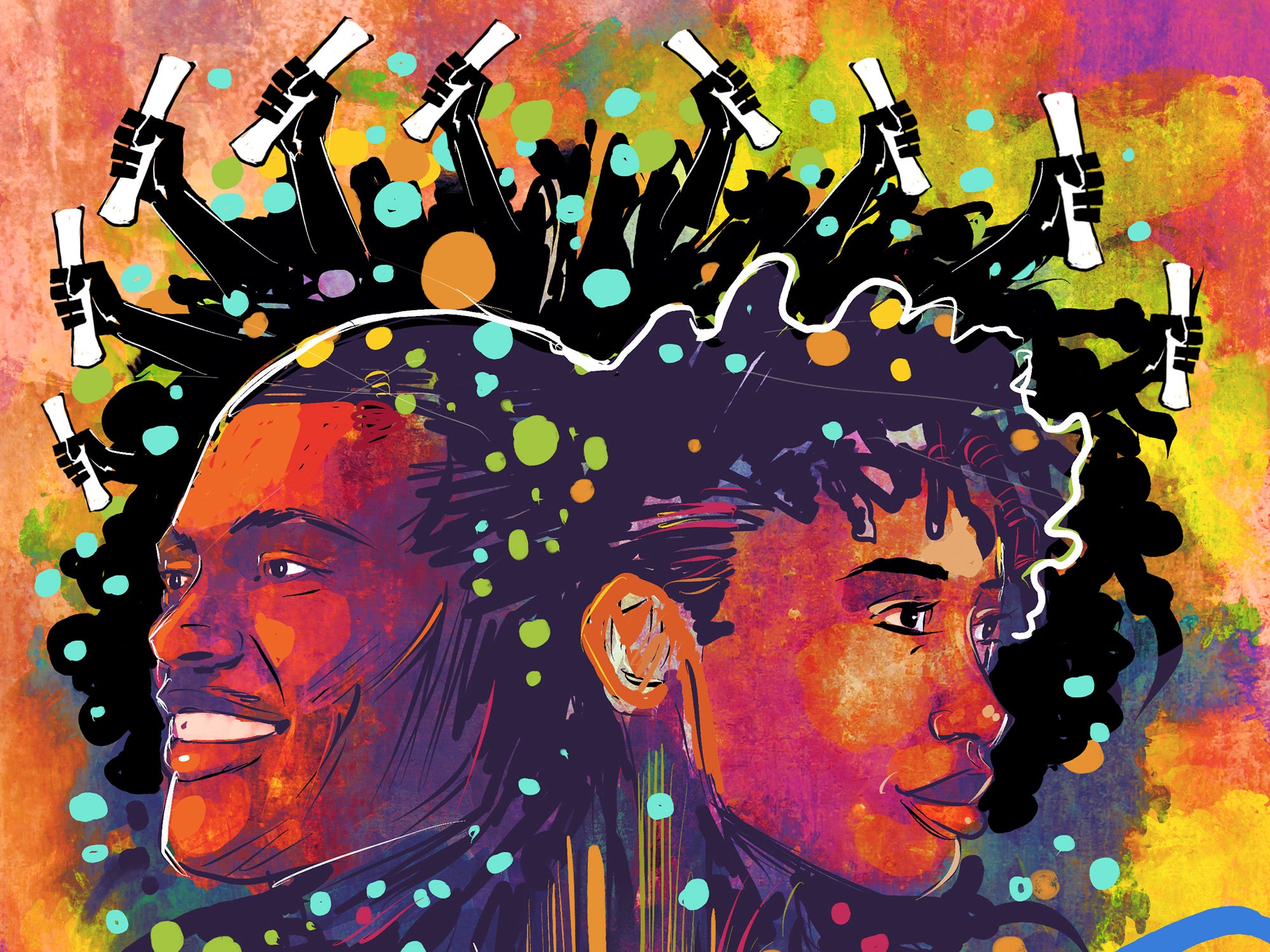
STILL RISING
CELEBRATING 50 YEARS OF AFRICAN STUDENT PROGRAMS
By Sandra Baltazar Martínez
acqueline “Jackie” Reese McDougal remembers the day a group of Black UC Riverside students visited her Los Angeles high school. It was the late 1960s, and, back then, John C. Fremont High School in South Central was predominantly African American. The UCR students were members of the Black Student Union, an organization that served as the precursor to what is now African Student Programs, or ASP. They spoke to the high schoolers about college requirements, university life, and what UCR had to offer. Reese McDougal credits their talk with inspiring her to enroll at UCR; later that year she joined a one-week summer program where she met other students, including her future UCR basketball cheer squad sisters.
“That helped expand the friendships at UC Riverside, because entering a predominantly white campus from a predominantly Black school was a bit of a shock,” said Reese McDougal, who came to UCR in 1969 and graduated in 1974 with a bachelor’s degree in Black Studies. “I can’t say all white students were welcoming, but definitely enough were to make me feel welcome. I felt equal.”
Reese McDougal’s connection to campus has continued long after her time as an undergraduate. She returned to UCR in 1980 and worked at the university for 31 years until her retirement as a regional coordinator for UCR’s Early Academic Outreach Program in 2011. As a student, she occasionally visited ASP and later worked closely with the center as a staff member. She said creating a home away from home and developing programs to help recruit students from underrepresented communities — like the ones she benefited from as a high school student — was crucial for student success.
This year marks the 50th anniversary of ASP — one of the first staffed ethnic centers on campus and in the country. Located in Costo Hall, ASP is a fixture of the campus and provides, among many things, development opportunities, educational and cultural programming, and mentorship for Black students. ASP also supports 15 affiliated student organizations, including the Black Student Union from which it originated.
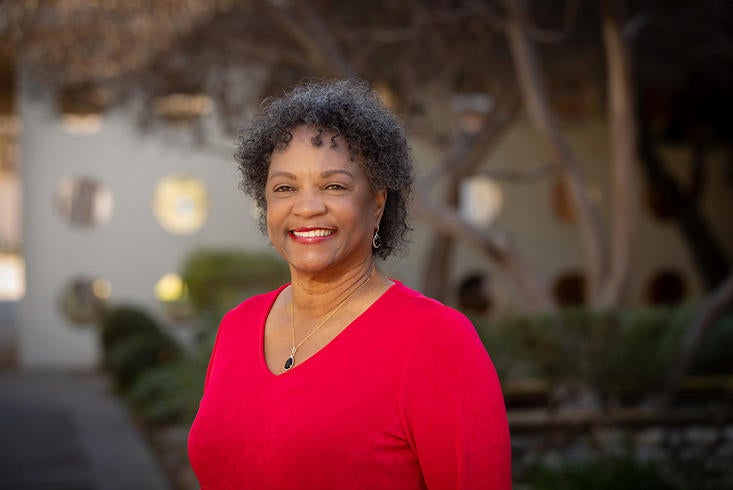
Its success is a testament to the resiliency of the Black student population throughout UCR’s history that made its existence possible, their contributions reflected in the center itself. Flags from around the world hang from the center’s ceiling, each one representing students who have stepped foot inside ASP. Its hallway is lined with portraits of smiling student faces, and at the center’s heart is the Martin Luther King Mural, a wall-length artwork painted in 2005, featuring Martin Luther King Jr. walking alongside other leaders such as Coretta Scott King, Rosa Parks, Gandhi, and César Chávez.
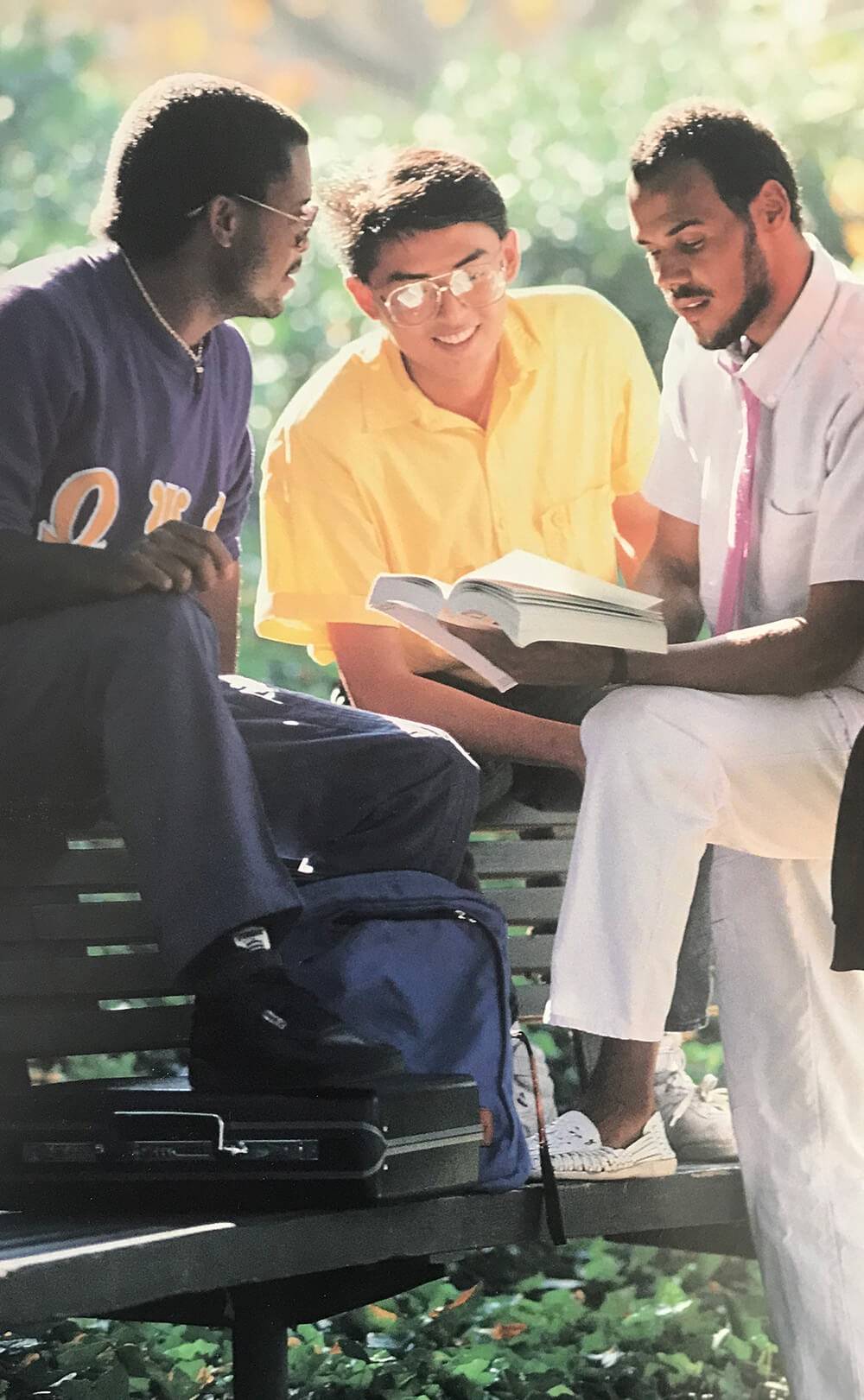
The Origins of ASP
While UCR serves a diverse student population today, it was not immune to the social unrest and discrimination that permeated the nation during the ’60s and ’70s. National and international student movements were protesting capitalism, demanding civil rights and democracy, and pushing for an end to the Vietnam War. At UCR, Black students began organizing to establish a greater presence and increase Black student enrollment, and in 1968, on the heels of the Civil Rights movement, about 60 students founded the Black Student Union, or BSU. The following year, BSU lobbied for the creation of a Black Studies Department with the help of late professors Carlton Rowland Bovell and Maurice Jackson — the university’s only Black faculty members at the time. The department was dissolved in 1984 and folded as a major under the newly formed Department of Ethnic Studies, which now offers master’s and doctoral degrees.
In its early days, an off-campus space known as the “Black House” became the hub for the former department as well as a natural meeting space for BSU and a place where Black students could find additional support. But on March 15, 1972, the Black House — located at 925 W. Blaine Street where Stonehaven campus apartments now sits — burned down. According to an article from The Sun newspaper, Riverside Fire Department officials said an arsonist had broken into the Black House during spring break, dousing enough gasoline to cause a small explosion. BSU lost all its literature, office supplies, and furniture in the fire, and Black students demanded a new on-campus space. Their plea was successful — and ASP was officially established as a center that year.
“Helping each other is a mainstay of the Black experience in the United States,” said Jasmin Young, assistant professor of ethnic studies at UCR, noting the early advocacy of Black students ensured the future of ASP. “That love for each other, together wanting to move forward and push forward — it’s a collective ethos.”
THEN, NOW, & FOREVER
As a high school student in Memphis, I experienced the power in being educated, mentored and reared by those who looked just like me. All of my teachers and 99% of the student population were African American. The need to code-switch went away, my hair was celebrated in its natural state, and I no longer had to teach the teacher how to pronounce my name. I felt like my teachers and administrators understood me and wanted me to succeed. There, I found village — a community of my peers that provided me with psychological safety. I felt safe to explore, learn, and be myself within a community of people who looked like me and shared the same or similar culture, history, and traditions. I knew I wanted my college experience to be a Black one because that meant I would have a village.
One of the reasons I chose to attend UCR was because, at the time, it had the highest population of Black students of all the UCs, approximately 7%. My life changed the day I walked into ASP. I met with then-director Kenneth E. Simons — he could see I was untethered and I would visit ASP regularly to fellowship with my village. I have built lifelong friendships with UCR alumni because of the village ASP provided. From Black scholar to Black Alumni Chapter president, it is important that I continue #villagebusiness in the form of servant leadership, through three individually impactful and equally important lenses: time, talent, and treasure.
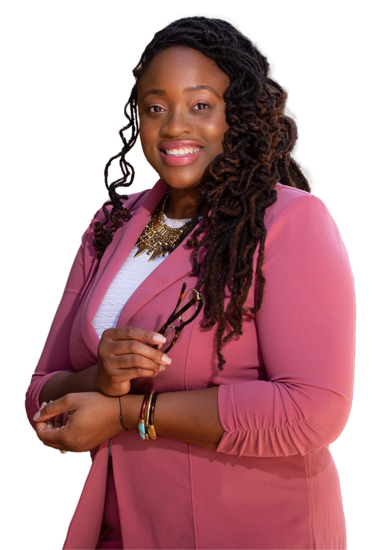
My first goal as president is to build an active pipeline between Black scholars and Black alumni at large. By partnering with ASP, Black alumni regularly provide Black scholars our time, talent, and treasure. We spend our time mentoring Black scholars through virtual and in-person meetings, workshops, events, and one-on-one connections. Connecting our Black scholars with the vast amount of talent in our network is what will build and sustain a powerful network of Black alumni for years to come.
My second goal is to establish a fully funded Black Alumni Chapter Endowment Fund, our treasure. Our board of Black alumni have established the very first Black Alumni Chapter Scholarship, which awards two scholarships twice per year. In partnership with ASP, we have established the ASP x BAC Then. Now. Forever Scholarship Fund, which is funded through donations made for Giving Tuesday annually. Additionally, we established Brilliantly Black, the annual UCR Black Alumni Chapter Scholarship Gala fundraiser.
It is a pleasure to serve as president of the UCR Black Alumni Chapter and partner with ASP, and an honor to continue our legacy by putting in work on #villagebusiness. Thank you for joining us as we celebrate ASP for 50 years of time, talent, and treasure — Then, Now, and Forever!
— Keona Henderson, UCR Black Alumni Chapter president
From the Ashes
Today, UCR has 1,510 Black students, including undergraduate, graduate, and medical students, and one of the smallest racial achievement gaps in the country. The six-year graduation rate in 2020 was 78.1% for Black students, 78.4% for white students, 73.7% for Latino students, and 81.8% for Asian students; six-year graduation rates at UCR from 2010 to 2016 show the gap between Black graduates and non-Black graduates was 4%, compared with the national average of 20%. These achievements are tied in part to the support students receive from ASP and Black student organizations and continued efforts to increase enrollment and opportunities for students since the center’s founding.
Growing up in Victorville, Jalani Bakari ’88 did not know anyone with a college degree. He struggled his first year at UCR, but found support in BSU and improved his grades, he said. When Bakari became BSU president in 1986, there were only 243 Black scholars enrolled, most from Southern California, and many — like him — the first in their families to attend college. Part of BSU’s mission was to return to local communities to educate kids about college and work with Black faculty and staff to establish programs to ensure students graduated. Bakari later joined Reese McDougal’s outreach and recruitment team as a student worker, inspired to share his experience with others like him. As an alumnus, Bakari is now part of UCR’s Chancellor’s Advisory Committees and chair of the Dr. Barnett and Eleanor Jean Grier Concerned Citizens of UCR, one of the oldest groups representing African American leaders, formed in 1982. His three children are also UC graduates — two from UCR.
“If a little raggedy kid from Victorville can graduate from UCR with chancellor’s awards, be a student-athlete, BSU president, then they can too,” Bakari said, noting he remains active in ASP and the campus community.
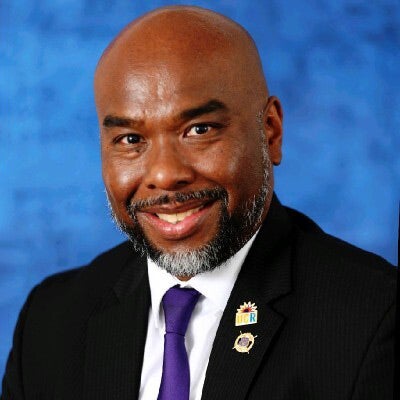
By the time Bert Wright ’99 came to UCR, he was among the first cohort of African American students who lived in the Pan-African Theme Hall, known as PATH, formerly at Aberdeen-Inverness Residence Hall and now in Pentland Hills. Wright eventually became the first male resident advisor for PATH. He said he learned about UCR from Bakari, who visited his high school in Hesperia as part of outreach efforts.
“When I was a senior and received the letter of acceptance from UCR, ASP sent me a VHS cassette,” said Wright, an entrepreneur and past president of the Black Alumni Chapter. “It was a recorded welcome video. It had an MTV vibe to it, and they said, ‘Hey, we are excited to see you. Can’t wait for you to come to campus.’”
Aaron Jones ’09, MA ’13, was also introduced to UCR through the outreach efforts of ASP. Growing up in South Central Los Angeles, the only “facts” he knew about college were what he saw on television and movies, he said. Jones had no vision for his future, but knew he needed to pursue higher education. At UCR, he found two homes: one at PATH, the second at ASP, where he also found a mentor in Kenneth Simons ’83, who served as ASP’s director from 2003-2017.
“How do I get internships? How can my organization do events? How do we connect with alumni?” Jones remembers asking. “ASP was a place for fun, but also for business — a place to study, a place for meetings. I made friends that I still hang out with.”
Jones graduated with a bachelor’s degree in English and a master’s in higher education administration and policy. He joined Alpha Phi Alpha fraternity, became an Associated Students of UCR member, and participated in the annual Afrikan Black Coalition Conference, known as the ABC Conference, a statewide organization that aims to unify the Black student community. At UCR, Jones often spoke during meetings with the provost, chancellor, and other community members and was part of the committee to hire UCR’s current chancellor, Kim A. Wilcox. He credits ASP and the ABC Conference with teaching him leadership skills, conflict resolution skills, and giving him the confidence to speak up.
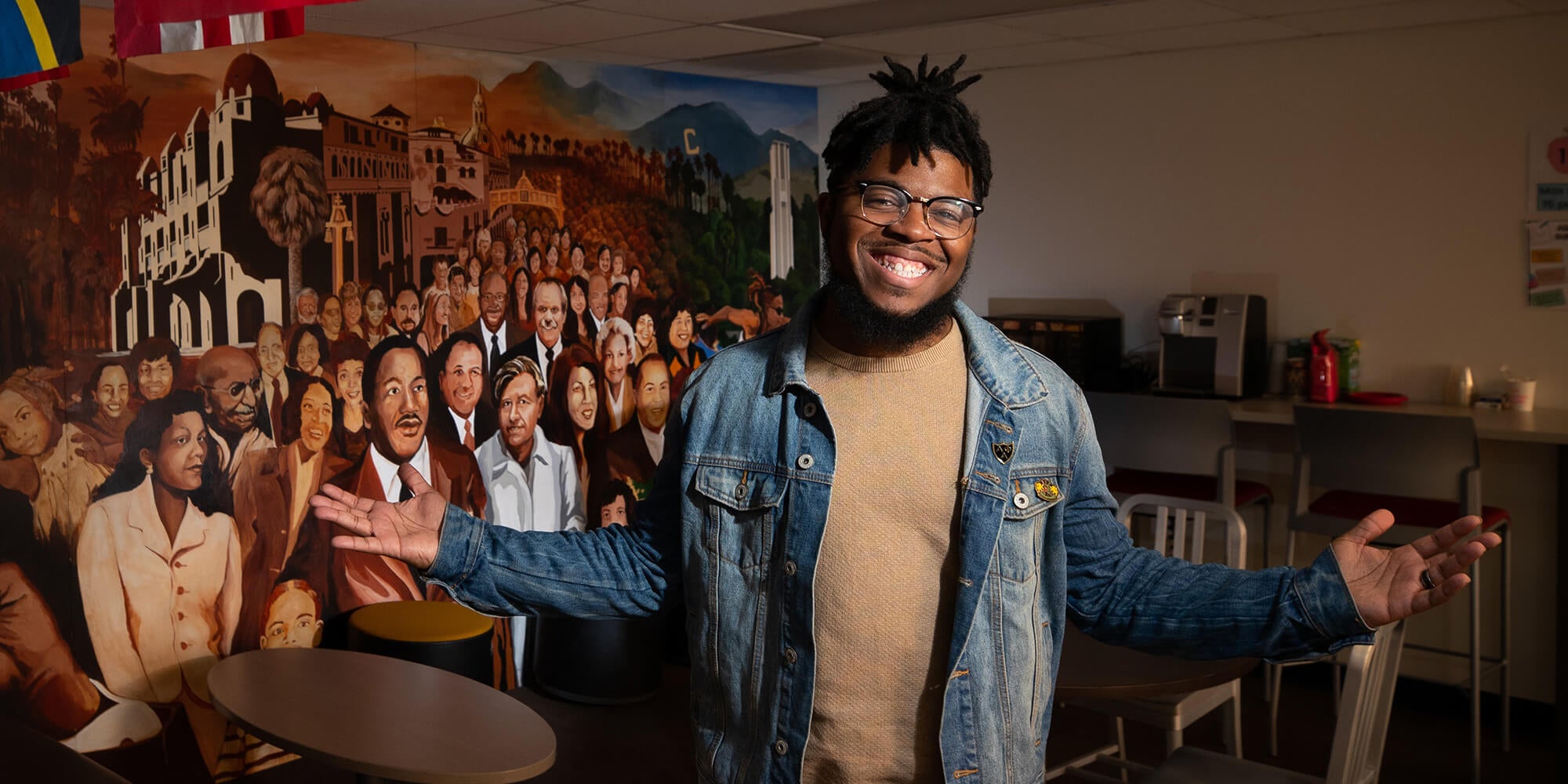
Room to Grow
While ASP and the Black student community have made significant strides in creating an inclusive and welcoming campus, Jones and others recognize there is still work to be done. During his graduate school years, Jones helped organize meetings with the UCR Police Department, or UCPD, after an uptick in racial profiling cases, he said.
“I had friends who were stopped when coming from their apartment to campus. It also happened to me — this despite the fact that I was wearing a staff shirt since I worked at Housing,” Jones said. “I was questioned when I was in my car waiting for a friend. Police couldn’t give any other reason for why they were questioning me, other than I was a Black male waiting in a car.”
Following the encounter, Jones asked then-UCR Police Chief Mike Lane to attend a townhall and hear students’ concerns. After the meeting, a taskforce was created by UCPD and the department modified its training. Jones said it is incidents like these that motivated him to remain in higher education; he currently serves as director for Educational Opportunity Programs at UC Santa Cruz.
For incidents such as this, ASP staff have had to serve as mediators between students and faculty or the administration. Before Wilcox became UCR’s leader, ASP staff worked with then-Chancellor Timothy P. White. Together they addressed microaggressions — forms of indirect, subtle, or unintentional discrimination — Black students were reporting. When it came to picking partners in science labs, for instance, some Black students reported being shunned. Other times, staff worked with the chancellor to address derogatory comments by faculty. Efforts to promote inclusivity remain an important mission for ASP today.
MAURICE JACKSON
sociology professor
(1925-1987)
Maurice Jackson was an internationally recognized Black scholar whose life-long passion was the elimination of racism. Jackson received a bachelor’s, master’s, and doctorate from UCLA. He became a lecturer at UCR in July 1965 and a full-time professor in 1980. Jackson taught courses including research methods and statistics, social psychology, and ethnic relations. His overriding interest and expertise lay in sociological theory, ethnicity, and racism. Among his professional achievements are serving as founding chair of UCR’s Black Studies Department, chair of UCR’s Department of Ethnic Studies, and the first executive specialist for women and minorities for the American Sociological Association, where he developed the organization’s Minority Graduate Fellowship Program. UCR established the Professor Maurice Jackson Endowed Scholarship Fund in his memory, providing awards to Black and minority students majoring in sociology.
CARLTON ROWLAND BOVELL
professor emeritus of biology
(1924-2019)
Carlton Rowland Bovell, an administrator and biologist, was the first tenured African American professor at UCR and among the first in the UC system. In 1957, he received a doctorate in biology from UC Davis and began his career in UCR’s biology department. Bovell’s roles as a UCR administrator included vice chair and acting chair of the biology department and two terms as chair of the UCR Division of the Academic Senate. In 1980, he became vice chancellor of UCR. Bovell was a champion of increasing diversity and representation of racial and ethnic minorities at UCR. He was chair of the Black Studies Program and instrumental in the establishment of the first chair for American Indian studies in the UC system at UCR in 1986, the third such program in the country at that time.
The Legacy of ASP
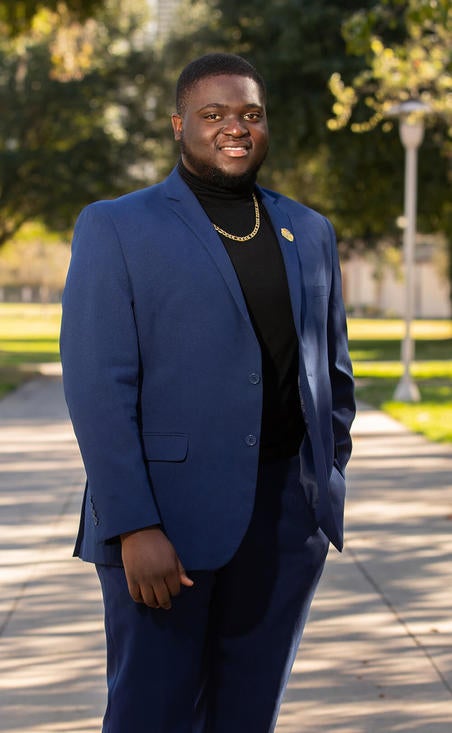
Now in its 50th year, ASP continues to grow. Jamal Myrick, ASP’s current director, said he is driven by the desire to make students welcome and successful and is inspired by other important moments of UCR’s Black history, including the first registered Black student in 1954, Martha Berkley; the first two Black graduates, Roy Overstreet and Zelma Ballard, who graduated in 1958 and 1959, respectively; and the burning of the Black House.
“To me, Black scholar success means having a place where scholars feel safe, they feel valued, and feel seen,” Myrick said. “It’s them feeling like a necessary part of this campus community. Not just when things are going bad, not just when it’s Black History Month, and not just when it’s cool, but throughout their whole time at UCR.”
Myrick has big plans for the center’s future. Prior to the pandemic, ASP was seeing 200 unique visitors a week, including students, staff, and faculty — growth he hopes leads to more office space and staff. Currently, Myrick and ASP staff are creating fundraising opportunities to reestablish a six-week summer bridge program to help students transition from high school to college, both academically and socially. In creating a larger Black community, Myrick also hopes ASP can work with International Affairs to design a new study abroad program in Africa.
Aiding in ASP’s goals are many UCR students and staff members including Victor Moreira ’07, an undergraduate academic advisor for the College of Humanities, Arts, and Social Sciences. Moreira’s experience as a former UCR student helps him connect with current students, he said. He also credits his experience at UCR with giving him a deeper appreciation of his Nigerian culture. As an undergraduate, Moreira joined the Nigerian Student Association, or NSA, as well as African Americans United in Science, or AAUS, which he said taught him skills he still uses today.
“When I came to campus in 2002, my second quarter, I took introduction to African American Studies. That class helped me understand myself as a Black man and Black person. It helped me become aware what role race plays in society. And it prompted me to get involved with the Black community at UCR,” said Moreira, who is currently chair of the Black Faculty and Staff Association.
Yaw Wiafe, a current public policy student, said he has developed a sense of cultural awareness, social justice, and the importance of being a student advocate during his time at UCR. He’s learned to value his Nigerian immigrant parents and appreciate the opportunity for an education in the U.S. Wiafe is currently studying Black-owned businesses and the financial, housing, and mental health impacts COVID is having on communities of color. After graduating, his goal is to attend law school.
Wiafe credits his mentors, including Myrick, with helping him transition from community college to starting at UCR in a virtual environment. Currently, he serves as ASP’s outreach specialist, vice president of Phi Beta Sigma fraternity, and is a member of NSA and Umoja — Swahili for “unity” — an organization that supports African American students in the community college system.
“The fact that we are here is a credit to the hard work of our ancestors,” Wiafe said, noting their efforts made it possible for him and others to attend UCR. “There is not one event or one moment that made this happen. It’s been a culmination of events and the impact of everyone’s hard work that we are here today.”
Support ASP by giving online at donate.ucr.edu/Winter2022.
Return to UCR Magazine: Winter 2022
